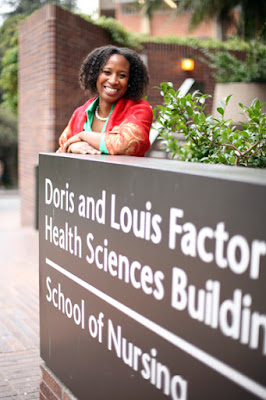 |
| Nalo Hamilton |
She entered college with a desire to become an obstetrician/ gynecologist, but Hamilton found that she enjoyed research. After graduating in 1995 from Oakwood University with a Bachelor of Science degree in biochemistry, she completed her Doctor of Philosophy degree, also in biochemistry, at Meharry Medical College. She then decided to go to nursing school and completed the Women’s Health Nurse Practitioner (WHNP) program at Vanderbilt University in 2005. She is now an assistant professor in the University of California, Los Angeles (UCLA) School of Nursing.
Hamilton chose a career in nursing because she believed it would provide better economic benefits than a career in biochemistry and a better lifestyle, as well. During her doctoral program, she had worked in a biochemistry laboratory an average of 80 hours per week and could not visualize doing that for the remainder of her career. She also believed that the unique blend of art and science found in nursing would “satisfy both halves of [her] brain.”
Returning to nursing school after completing a terminal degree presented many challenges and interesting situations for Hamilton. She worked as a certified nursing assistant while in nursing school and remembers one charge nurse stating, “I will never address you as 'Doctor,'” although Hamilton had not asked to be addressed as such. Conversely, while most nursing students were afraid to speak to physicians, Hamilton received respect from physicians who knew she had a PhD in biochemistry. They often consulted her on patient treatment options and included her in discussions about patients’ care plans. Collaborating with physicians is not typical for nursing students, even those in entry-level master’s programs.
Hamilton’s teaching experience includes several science and nursing courses, at various levels of nursing education. For almost four years, she taught undergraduate courses at other academic institutions in obstetrics, pharmacology and physical assessment. In the past year, she taught the N211 Women’s Health course at the master’s level in UCLA’s advanced practice nursing program. Hamilton admits that her decision to become a WHNP has allowed her to select the courses she teaches, and she encourages future nursing professors to specialize in an area about which they are passionate.
Hamilton’s teaching-learning philosophy is one familiar to many nursing students. She supports active learning and team teaching, sees herself as a facilitator of learning and believes that teaching and learning should be interactive. She avoids solely lecturing during class and often incorporates case studies within her lectures. For Hamilton, it is important that students are able to apply textbook reading to nursing practice, and she assigns group work to encourage participation by reluctant or introverted students. Hamilton subscribes to a grading style that is customary in nursing education; she does not grade on a curve. Her objective as a professor is not to foster a spirit of competition among students but, instead, “to create students who are safe and competent in practice.”
Asked why she chose an academic rather than clinical career, Hamilton replies, “It chose me.” After graduating from Vanderbilt, she initially looked for clinical positions but did not receive many offers, so went into academia. She has found that she enjoys working as an academic educator because it satisfies her love for science and her curiosity. However, although she is a full-time educator and researcher, Hamilton also works as a WHNP one day per week.
Her day-to-day activities include management of e-mails and phone calls, ordering supplies for and supervising staff in her research laboratory and preparing for class lectures. She says that, as an educator, it is important that she maintain a certain level of sanity, and she does this by running, reading, trying not to work at home and by establishing mentoring relationships with senior professors. Hamilton acknowledges that her to-do list is rarely completed. It is imperative, she says, to refrain from over-committing oneself and believes in “the power of no,” that one must decline offers and invitations, at times, to complete previously established tasks and to rejuvenate.
For Hamilton, the challenges of teaching include the aforementioned ability to maintain balance and sanity, and the rewards are those that come from “a job well done.” Among those rewards, she also includes sharing in the personal successes of students and observing their academic and clinical growth throughout the academic term and during their time in the nursing program.
A 2011 Robert Wood Johnson Foundation Nurse Faculty Scholar, Hamilton has had fascinating experiences that have helped shape her career as a nursing professor and bench scientist. Her success as a nurse educator suggests that even young nurses can be successful and that a lengthy career in nursing is not a prerequisite to success in the profession. Hamilton has taken the road less traveled in the nursing profession, but her success has shown it was not a bad road to take.
For Reflections on Nursing Leadership (RNL), published by the Honor Society of Nursing, Sigma Theta Tau International.
I had the pleasure of hearing one of Dr. Hamilton's presentations. What an inspiration!
ReplyDeleteYes, Maria, she is simply amazing. I had the opportunity to attend a conference with her and I was blessed to soak up some of her wisdom. I hope to be able to TA for her at some point. She has a lot of insight to provide as a researcher, educator, and a woman from a ethnic minority background.
ReplyDelete